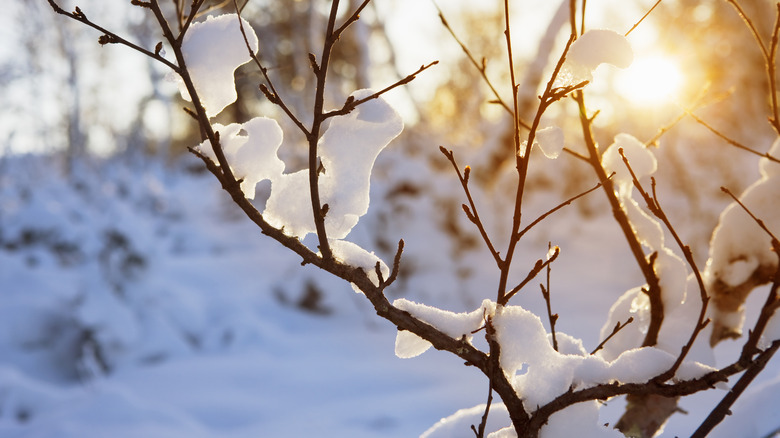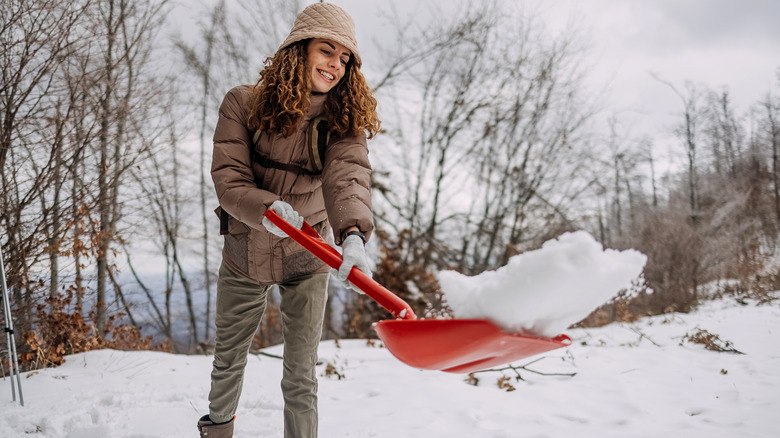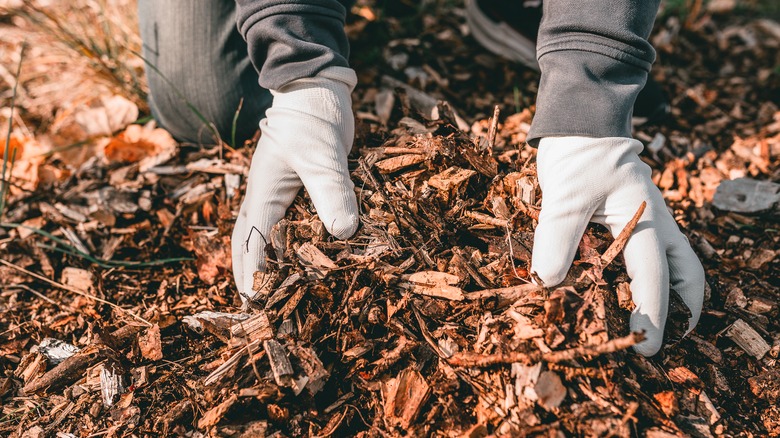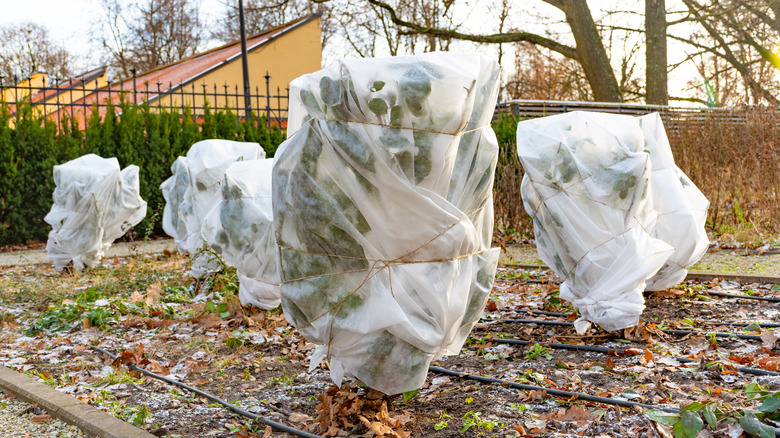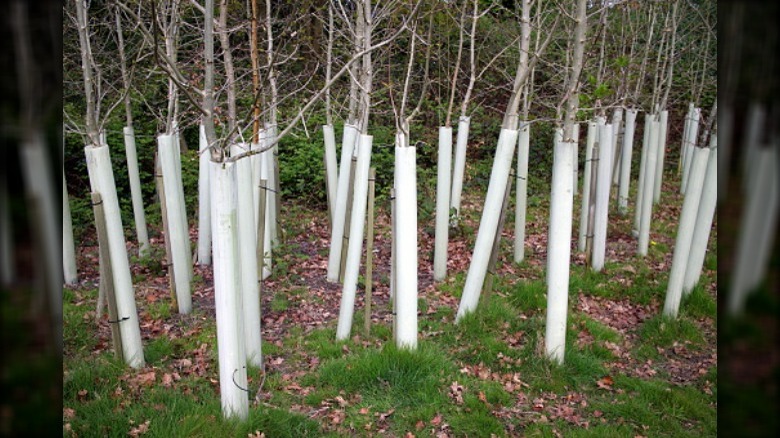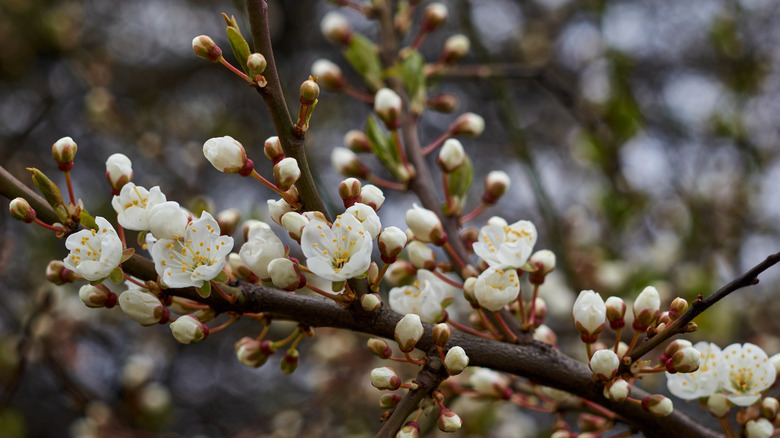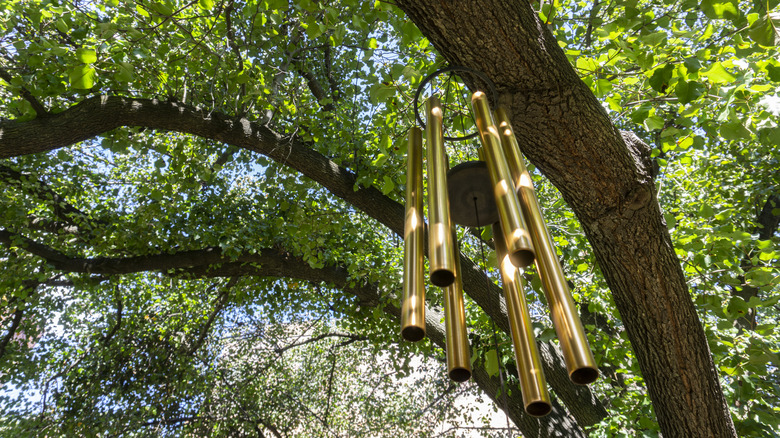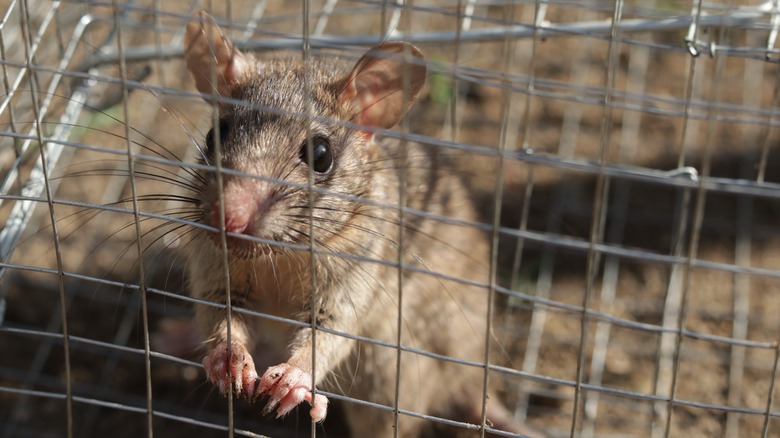Tips To Keep Your Trees Safe From Animal Damage This Winter
We may receive a commission on purchases made from links.
If you have put considerable TLC into growing healthy trees around your home, then you surely want to protect them from animals that scratch, break, and eat your plants. Although it might be difficult at times to figure out what annoying critters are causing havoc on your greenery, trying to nail it down is worth the effort. That's because knowing what's harming your trees can help you know what kind of defense you can use to keep the pests away.
For instance, you might be dealing with deer, mice, rabbits, and voles. While deer can eat away at any leaves and pine needles on your trees, the bucks can damage them by aggressively rubbing their antlers against the bark, which breaks it off. Mice, rabbits, and voles, as well as squirrels and porcupines, can also cause a considerable amount of damage– despite being on the smaller side as they eat the inner bark. Woodpeckers also target this area to find what they consider to be an ideal meal inside in the form of insects.
If you can't figure out exactly what's damaging your trees, then you may want to protect them from various creatures that can target the branches, bark, and more. You simply need to know what methods work best in each circumstance so that you can take action before winter rolls around.
Remove excessive snow
Anyone who lives in a part of the country that gets chilly weather in the winter knows that a considerable amount of snow might be an inevitable part of the season. However, that doesn't mean you have to sit back and accept how it may lead to damaged trees. Although the snow itself isn't exactly the problem, it can lead to issues when it becomes piled up around the bottom of your tree. This spot could be hiding smaller critters that like to eat your trees, like mice and other rodents.
Get rid of any mulch
Snow built up around the bottom of a tree isn't the only place annoying little critters may be found during the cold winter season. You might also come across them nestling in mulch, which makes a nice, safe spot for them to hide when they're not nibbling on (and harming) the trees on your property. In order to protect your trees, be sure to get rid of any mulch that is around the base of your trees to make the area less hospitable for unwanted creatures.
Wrap up smaller trees
If you have smaller trees, you might want to wrap them up over the winter. Along with the fact that this can help protect them from the extreme cold, strong winds, and heavy snow, it can also keep pests from reaching the delicate bark or branches. Simply grab some burlap or mesh and cover the top of the tree. Clip or tie it onto the center of the tree before moving down and then back up as you wrap. Finally, use twine to securely tie the wrapping so that it stays snuggly in place.
Set up tree guards
Take the idea of burlap one step further by setting up tree guards. Made of thick plastic material, a tube can be placed around smaller trees to keep them safe from harmful pests that might eat or scratch the bark on the lower sections. With pre-made products created and sold to suit your needs, you'll just need to wrap them around your trees and step back to watch them work. Although there are plenty of options available, the Wesiti Spiral Tree Guards can be found on Amazon for about $32.
Use animal repellents
In the same way you might use insect repellent to keep mosquitoes from biting you, you can use animal repellents to keep animals from nibbling or scratching your trees. Again, you have a range of choices, such as using something hot and spicy, like chili peppers, to keep critters away. Urine from predators could also do the trick, even if it is a little icky. If you decide to use repellents, be sure to note that they can be covered or washed away as snow falls and melts, so you'll need to reapply often.
Put up fencing
When it comes to keeping larger animals from destroying your trees during winter, you might need a fence. By putting up fencing, you'll be keeping the problematic animals from making their way onto your property and in the range of your trees. You may want to opt for a fence around your entire outdoor area, around your garden, or just around each tree. You can also use anything from an electrical fence to one made of a fishing line. Although this method might take a little money or effort, the bonus is that it will work year-round.
Use bud caps
For anyone who hasn't used or even heard of bud caps before, you can rest assured that they're exactly what you think. A little cap can be placed over the buds on a tree, and it protects the delicate part of your large plants from hungry deer who like to eat them. You can make bud caps yourself by getting pieces of bond paper that are 4 by 5 inches. Fold the paper over the buds before carefully securing them in place with a clip, staple, or twine.
Add a shiny windchime
You may love the look and sound of windchimes, but not all creatures feel the same way. In fact, woodpeckers can sometimes be scared off by anything shiny or loud. Fortunately, you can use that to your advantage by putting a windchime in your trees to deter harmful woodpeckers from stopping by. That includes pileated woodpeckers, downy woodpeckers, flicker woodpeckers, and more. If you have more than one tree that you want to protect, then you can either put a windchime in each one or place a single windchime in the general area.
Make your yard unappealing
You likely want your outdoor space to be welcoming. At least, you want it to feel welcoming to your family and friends. At the same time, you don't want it to feel welcoming to animals that end up damaging your trees over the winter months. That's why you can do things to make your yard an unappealing place for deer, rodents, and more. Use plants that keep deer away in the spring and summer, and the creatures will come to recognize that your property isn't a fun place for them to be in the winter, either.
Safely trap and relocate critters
Some animals that end up damaging your trees during winter simply won't take the hint and keep returning despite your best efforts. In that case, you might need a trap to capture the creature. Of course, you'll want to use something safe for both you and the animal. You'll also want to make sure that it's relocated to a spot that's more appropriate for them to live. If you can't handle the trapping and transporting yourself, you can always call in a pro for some help.
